外研版(九年级下册Module 2 Education Unit 1课件(共30张PPT,内嵌音频)
文档属性
| 名称 | 外研版(九年级下册Module 2 Education Unit 1课件(共30张PPT,内嵌音频) | 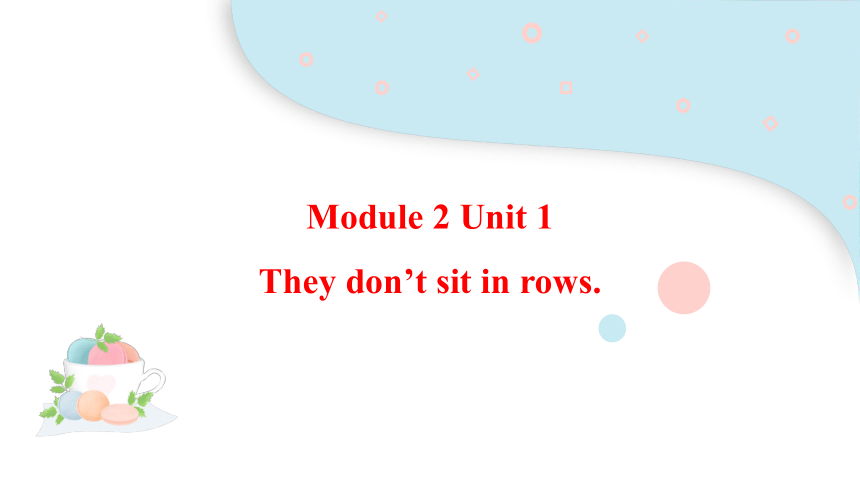 | |
| 格式 | pptx | ||
| 文件大小 | 4.8MB | ||
| 资源类型 | 教案 | ||
| 版本资源 | 外研版 | ||
| 科目 | 英语 | ||
| 更新时间 | 2025-04-27 20:13:34 | ||
图片预览

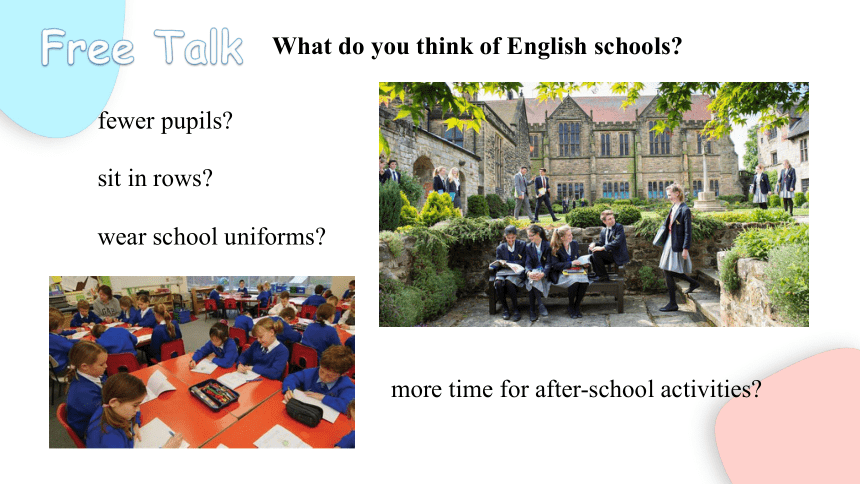
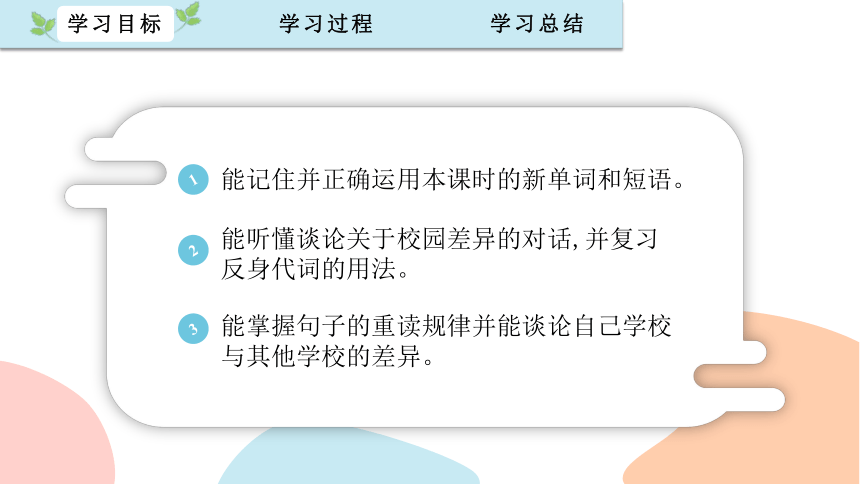
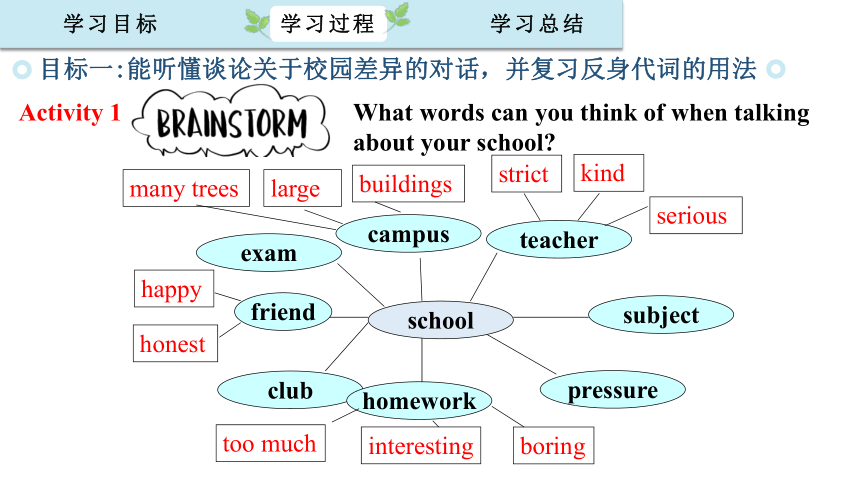
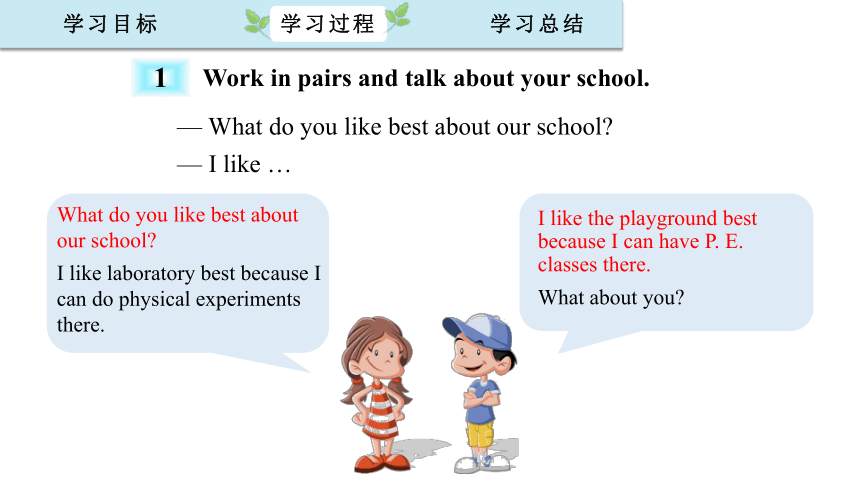
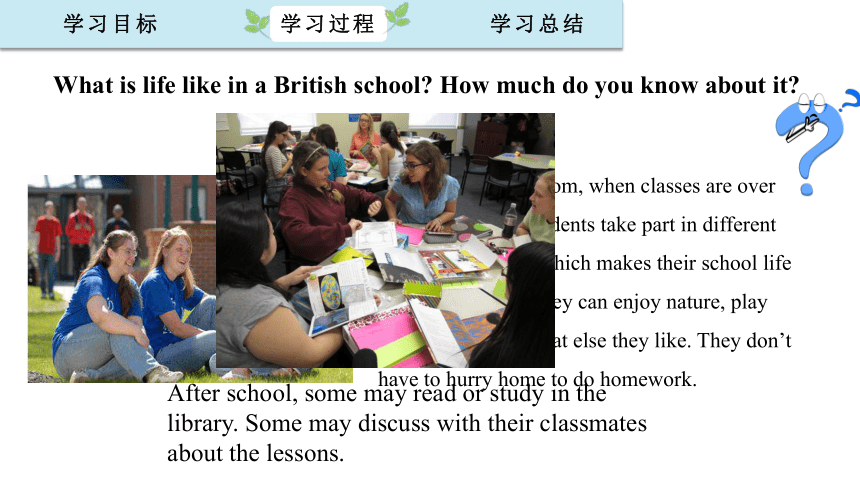
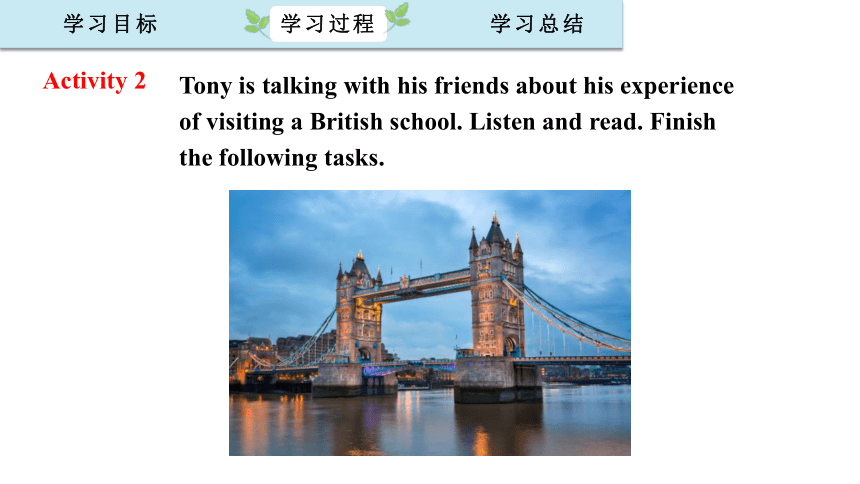
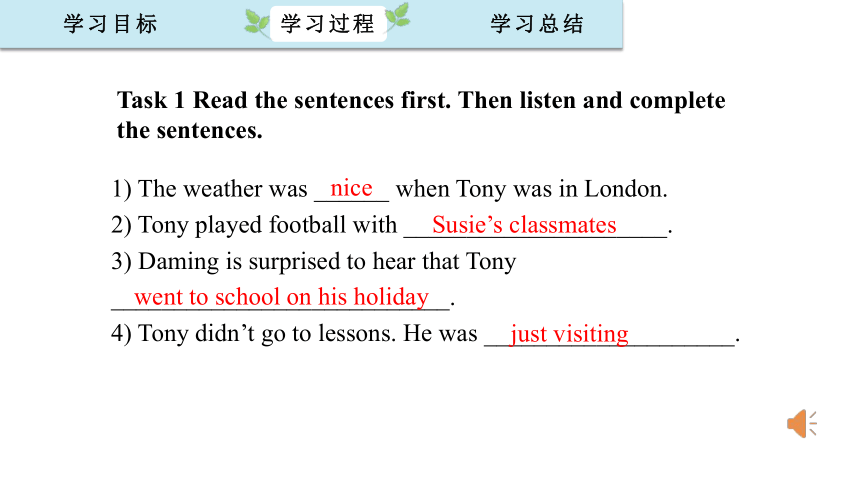
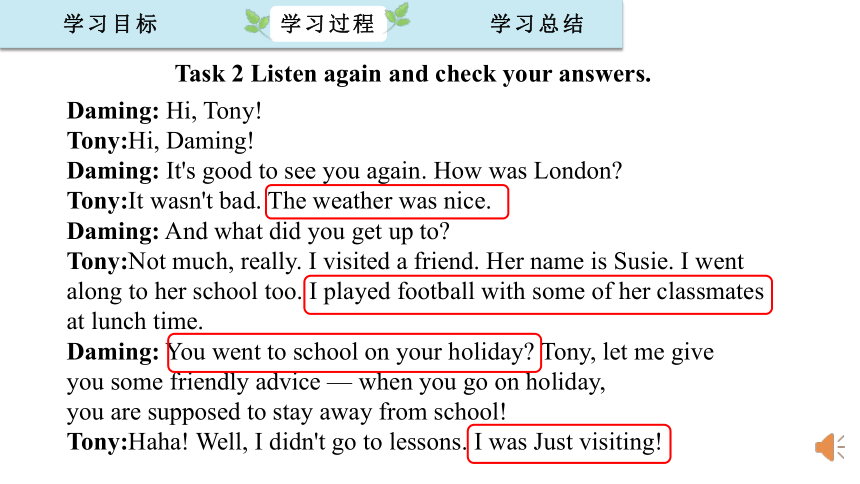
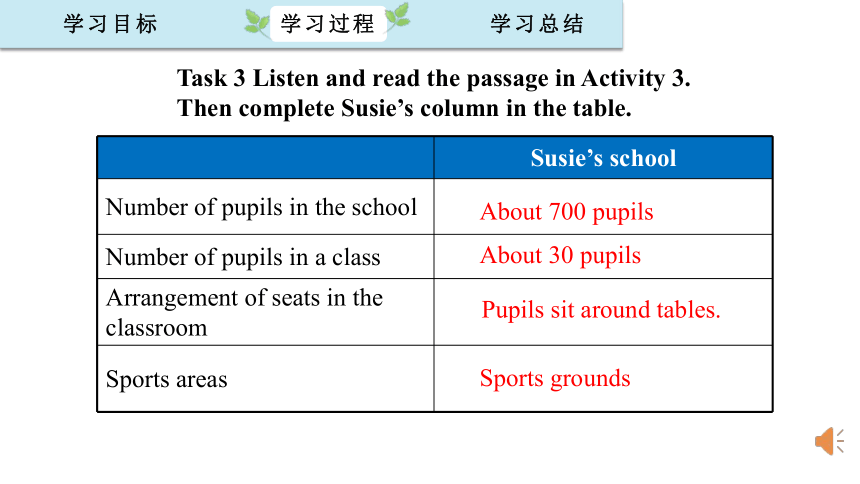
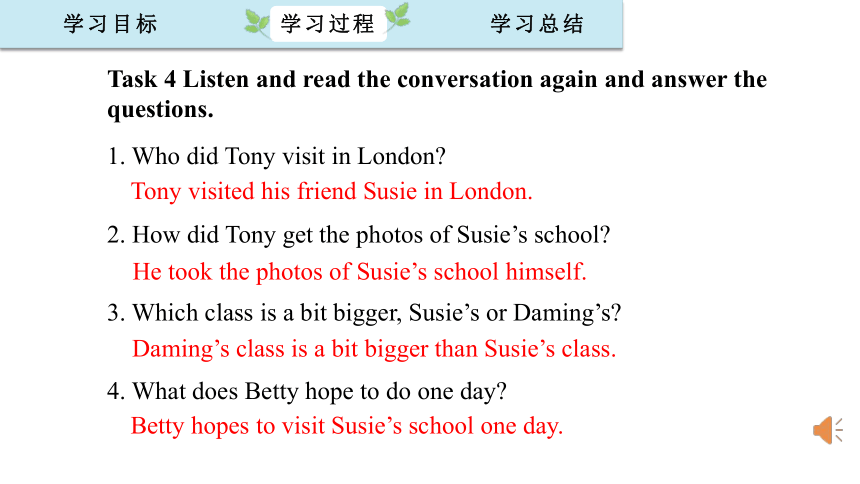
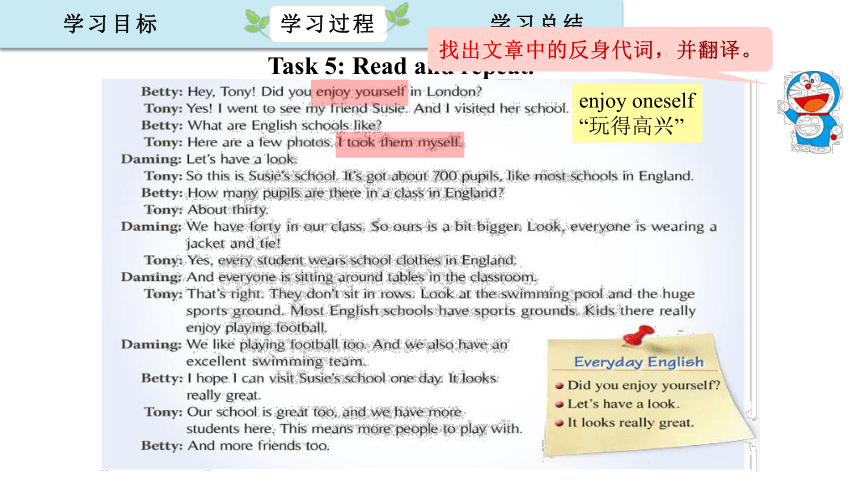
文档简介
(共30张PPT)
Module 2 Unit 1
They don’t sit in rows.
Free Talk
What do you think of English schools
wear school uniforms
sit in rows
fewer pupils
more time for after-school activities
1
2
能记住并正确运用本课时的新单词和短语。
3
能听懂谈论关于校园差异的对话,并复习反身代词的用法。
能掌握句子的重读规律并能谈论自己学校与其他学校的差异。
目标一:能听懂谈论关于校园差异的对话,并复习反身代词的用法
What words can you think of when talking about your school
Activity 1
club
campus
teacher
subject
pressure
homework
school
friend
exam
strict
kind
serious
too much
interesting
boring
large
buildings
many trees
happy
honest
1
Work in pairs and talk about your school.
— What do you like best about our school
— I like …
I like the playground best because I can have P. E.
classes there.
What do you like best about our school
I like laboratory best because I can do physical experiments there.
What about you
What is life like in a British school How much do you know about it
In the United Kingdom, when classes are over in the afternoon, students take part in different outdoor activities, which makes their school life more interesting. They can enjoy nature, play ball games or do what else they like. They don’t have to hurry home to do homework.
After school, some may read or study in the library. Some may discuss with their classmates about the lessons.
Tony is talking with his friends about his experience of visiting a British school. Listen and read. Finish the following tasks.
Activity 2
Task 1 Read the sentences first. Then listen and complete the sentences.
1) The weather was ______ when Tony was in London.
2) Tony played football with _____________________.
3) Daming is surprised to hear that Tony ___________________________.
4) Tony didn’t go to lessons. He was ____________________.
nice
Susie’s classmates
went to school on his holiday
just visiting
Task 2 Listen again and check your answers.
Daming: Hi, Tony!
Tony:Hi, Daming!
Daming: It's good to see you again. How was London
Tony:It wasn't bad. The weather was nice.
Daming: And what did you get up to
Tony:Not much, really. I visited a friend. Her name is Susie. I went along to her school too. I played football with some of her classmates at lunch time.
Daming: You went to school on your holiday Tony, let me give
you some friendly advice — when you go on holiday,
you are supposed to stay away from school!
Tony:Haha! Well, I didn't go to lessons. I was Just visiting!
Task 3 Listen and read the passage in Activity 3. Then complete Susie’s column in the table.
Susie’s school
Number of pupils in the school
Number of pupils in a class
Arrangement of seats in the classroom
Sports areas
About 700 pupils
About 30 pupils
Pupils sit around tables.
Sports grounds
Task 4 Listen and read the conversation again and answer the questions.
1. Who did Tony visit in London
2. How did Tony get the photos of Susie’s school
3. Which class is a bit bigger, Susie’s or Daming’s
4. What does Betty hope to do one day
Tony visited his friend Susie in London.
He took the photos of Susie’s school himself.
Daming’s class is a bit bigger than Susie’s class.
Betty hopes to visit Susie’s school one day.
Task 5: Read and repeat.
找出文章中的反身代词,并翻译。
enjoy oneself “玩得高兴”
填一填
Revision
反身代词 词义 反身代词 词义
我自己 它自己
你自己 我们自己
他自己 你们自己
她自己 他们自己
myself
yourself
himself
herself
itself
ourselves
yourselves
themselves
I took them myself. 我自己拍的。
You’d better ask your teacher himself.
你最好去问问你老师本人。
We should take care of ourselves.
我们应该照顾好自己。
这里的反身代词myself在句中作同位语,起加强语气的作用。反身代词在句中还可以作宾语。
说出下列句子中反身代词的用法。
(作同位语)
(作介词的宾语)
Activity 3
Work in groups. Find out some language points that you think are important and share their use with your classmates and give some examples.
Language points:_______________________
_____________________________________
_____________________________________
____________________________________
_____________________________
Language points
1. What are English schools like 英国的学校怎么样?
① 用于询问对某事物的评价。
e.g. —What was the exam like
—It was not very difficult.
② 用于询问天气情况。
e.g. —What’s the weather like
—It’s cloudy.
③ 用于询问某人的外表,或者性格、品质。
e.g.—What’s your new neighbour like
—He’s friendly and he often wears a pair of glasses.
What is … like 意为“……是什么样的/怎么样?”主要用法如下:
2. It’s got about 700 pupils. 有大约700个学生。
have / has got在形式上是现在完成时,但在内容上却是现在时,在口语中常用来代替have / has。
e.g. I have lost my ruler. Please lend me yours.
我的尺子丢了。请把你的借我用一下。
(1) 名词性物主代词具有名词的特征,相当于“形容词性物主代词+名词”。
(2) a bit 和a little都意为“稍微,一点儿”。二者的主要用法如下:
① a bit 和 a little 在肯定句中修饰动词、形容词、 副词及其比较级,表示“ 一点儿”。
e.g. You’d better drive a bit/a little slower.
3. So ours is a bit bigger. 因此我们的(班级)稍大一点儿。
② a little和a bit都只能修饰不可数名词。a little可以直接作定语修饰名词,而a bit用于名词之前时应先接介词 of。
e.g. He knows a bit of /a little French.
③ a bit 和 a little 在否定句中意思相反。
not a bit = not at all 一点儿都不
not a little = very 很,非常
e.g. He’s not a bit angry. = He’s not angry at all. 他一点也不生气。
He’s not a little angry. = He’s very angry. 他非常生气。
穿/戴(衣帽/鞋袜/眼镜/…) wear put on be in
强调状态 强调动作 强调款式/颜色
1.Do you know the woman _____ red
2.My grandpa always ______ a pair of glasses.
3._______ your coat quickly, it’s cold outside.
in
wears
Put on
4. Look, everyone is wearing a jacket and tie!
看,每个人都穿西装打领带!
填一填
5. I hope I can visit Susie’s school one day.
希望我有一天可以去苏西的学校。
e.g. One day we’ll both get to see New York.
总有一天我俩都有机会看看纽约。
One day he was late for school.
有一天他上学迟到了。
Some day / One day, I’ll be a pilot.
有朝一日,我会成为一名飞行员。
one day意为“某一天,有一天”,既可用于过去时中,也可用于将来时中。some day(或someday )也有“某一天”之意,但它指的是“将来的某一天”,用在将来时中。
5
Complete the passage with the correct form of the words in the box.
Pupils in England do not sit in (1) ______ in the classroom. They sit around tables. Everyone (2) _______ a jacket and (3) _____. Most schools have sports grounds, and English children (4) _______ playing football, just as pupils in China do. Some English schools have swimming (5) ______, but not all of them do.
tie
rows
wears
enjoy
pools
enjoy pool row tie wear
目标二:能掌握句子的重读规律并能谈论自己学校与其他学校的差异
Activity 1
6
Read and predict which words the speaker is likely to stress.
Now listen and check.
观察句子,思考重读规律
Betty: Hey, Tony! Did you enjoy yourself in London
Tony: Yes! I went to see my friend Susie. And I visited her school.
Betty: What are English schools like
Tony: Here are a few photos. I took them myself.
英语句子一般由多个单词构成,这些单词的重读一般遵循以下规律:名词、形容词、数词、动词、副词、代词和表达强烈思想感情的感叹词需要重读;人称代词、连词、冠词、介词、以及少数系动词和助动词等主要起语法作用的单词一般不重读(当然有少数例外)。
Stress 重读
在具体的语境中,句子中重读的单词不同,所表达的意思也会不同。
What’s wrong with you
What’s wrong with you
What’s wrong with you
7
Work in pairs. Read the conversation in Activity 6 aloud.
根据重读的单词思考句子所表达的意思。
(Are you ill )
(Everybody else is OK.)
(Are you feeling happy or sad )
Activity 2
Role play
Role play the conversation in activity 3 of the textbook.
Pay attention to the stress words.
Activity 3
8
Complete Your school column below.
Susie’s school Your school
Number of pupils in the school
Number of pupils in a class
Arrangement of seats in the classroom
Sports areas
About 700 pupils
About 30 pupils
Pupils sit around tables.
Sports grounds
Now work in pairs and compare your school with Susie’s school. Say:
what both schools have
what one school has but the other does not
Possible answer:
Both schools are very nice. Both schools have a few science laboratories, a music room, a swimming pool and a huge sports ground. Our school has a big library, but Susie’s school doesn’t. Susie’s school has a hall for concerts, but our school doesn’t. There are 64 pupils in a class in our school, but there are only 30 pupils in a class in Susie’s school.
Do you know how to compare
your school with other people’s schools
Summary
Module 2 Unit 1
They don’t sit in rows.
Free Talk
What do you think of English schools
wear school uniforms
sit in rows
fewer pupils
more time for after-school activities
1
2
能记住并正确运用本课时的新单词和短语。
3
能听懂谈论关于校园差异的对话,并复习反身代词的用法。
能掌握句子的重读规律并能谈论自己学校与其他学校的差异。
目标一:能听懂谈论关于校园差异的对话,并复习反身代词的用法
What words can you think of when talking about your school
Activity 1
club
campus
teacher
subject
pressure
homework
school
friend
exam
strict
kind
serious
too much
interesting
boring
large
buildings
many trees
happy
honest
1
Work in pairs and talk about your school.
— What do you like best about our school
— I like …
I like the playground best because I can have P. E.
classes there.
What do you like best about our school
I like laboratory best because I can do physical experiments there.
What about you
What is life like in a British school How much do you know about it
In the United Kingdom, when classes are over in the afternoon, students take part in different outdoor activities, which makes their school life more interesting. They can enjoy nature, play ball games or do what else they like. They don’t have to hurry home to do homework.
After school, some may read or study in the library. Some may discuss with their classmates about the lessons.
Tony is talking with his friends about his experience of visiting a British school. Listen and read. Finish the following tasks.
Activity 2
Task 1 Read the sentences first. Then listen and complete the sentences.
1) The weather was ______ when Tony was in London.
2) Tony played football with _____________________.
3) Daming is surprised to hear that Tony ___________________________.
4) Tony didn’t go to lessons. He was ____________________.
nice
Susie’s classmates
went to school on his holiday
just visiting
Task 2 Listen again and check your answers.
Daming: Hi, Tony!
Tony:Hi, Daming!
Daming: It's good to see you again. How was London
Tony:It wasn't bad. The weather was nice.
Daming: And what did you get up to
Tony:Not much, really. I visited a friend. Her name is Susie. I went along to her school too. I played football with some of her classmates at lunch time.
Daming: You went to school on your holiday Tony, let me give
you some friendly advice — when you go on holiday,
you are supposed to stay away from school!
Tony:Haha! Well, I didn't go to lessons. I was Just visiting!
Task 3 Listen and read the passage in Activity 3. Then complete Susie’s column in the table.
Susie’s school
Number of pupils in the school
Number of pupils in a class
Arrangement of seats in the classroom
Sports areas
About 700 pupils
About 30 pupils
Pupils sit around tables.
Sports grounds
Task 4 Listen and read the conversation again and answer the questions.
1. Who did Tony visit in London
2. How did Tony get the photos of Susie’s school
3. Which class is a bit bigger, Susie’s or Daming’s
4. What does Betty hope to do one day
Tony visited his friend Susie in London.
He took the photos of Susie’s school himself.
Daming’s class is a bit bigger than Susie’s class.
Betty hopes to visit Susie’s school one day.
Task 5: Read and repeat.
找出文章中的反身代词,并翻译。
enjoy oneself “玩得高兴”
填一填
Revision
反身代词 词义 反身代词 词义
我自己 它自己
你自己 我们自己
他自己 你们自己
她自己 他们自己
myself
yourself
himself
herself
itself
ourselves
yourselves
themselves
I took them myself. 我自己拍的。
You’d better ask your teacher himself.
你最好去问问你老师本人。
We should take care of ourselves.
我们应该照顾好自己。
这里的反身代词myself在句中作同位语,起加强语气的作用。反身代词在句中还可以作宾语。
说出下列句子中反身代词的用法。
(作同位语)
(作介词的宾语)
Activity 3
Work in groups. Find out some language points that you think are important and share their use with your classmates and give some examples.
Language points:_______________________
_____________________________________
_____________________________________
____________________________________
_____________________________
Language points
1. What are English schools like 英国的学校怎么样?
① 用于询问对某事物的评价。
e.g. —What was the exam like
—It was not very difficult.
② 用于询问天气情况。
e.g. —What’s the weather like
—It’s cloudy.
③ 用于询问某人的外表,或者性格、品质。
e.g.—What’s your new neighbour like
—He’s friendly and he often wears a pair of glasses.
What is … like 意为“……是什么样的/怎么样?”主要用法如下:
2. It’s got about 700 pupils. 有大约700个学生。
have / has got在形式上是现在完成时,但在内容上却是现在时,在口语中常用来代替have / has。
e.g. I have lost my ruler. Please lend me yours.
我的尺子丢了。请把你的借我用一下。
(1) 名词性物主代词具有名词的特征,相当于“形容词性物主代词+名词”。
(2) a bit 和a little都意为“稍微,一点儿”。二者的主要用法如下:
① a bit 和 a little 在肯定句中修饰动词、形容词、 副词及其比较级,表示“ 一点儿”。
e.g. You’d better drive a bit/a little slower.
3. So ours is a bit bigger. 因此我们的(班级)稍大一点儿。
② a little和a bit都只能修饰不可数名词。a little可以直接作定语修饰名词,而a bit用于名词之前时应先接介词 of。
e.g. He knows a bit of /a little French.
③ a bit 和 a little 在否定句中意思相反。
not a bit = not at all 一点儿都不
not a little = very 很,非常
e.g. He’s not a bit angry. = He’s not angry at all. 他一点也不生气。
He’s not a little angry. = He’s very angry. 他非常生气。
穿/戴(衣帽/鞋袜/眼镜/…) wear put on be in
强调状态 强调动作 强调款式/颜色
1.Do you know the woman _____ red
2.My grandpa always ______ a pair of glasses.
3._______ your coat quickly, it’s cold outside.
in
wears
Put on
4. Look, everyone is wearing a jacket and tie!
看,每个人都穿西装打领带!
填一填
5. I hope I can visit Susie’s school one day.
希望我有一天可以去苏西的学校。
e.g. One day we’ll both get to see New York.
总有一天我俩都有机会看看纽约。
One day he was late for school.
有一天他上学迟到了。
Some day / One day, I’ll be a pilot.
有朝一日,我会成为一名飞行员。
one day意为“某一天,有一天”,既可用于过去时中,也可用于将来时中。some day(或someday )也有“某一天”之意,但它指的是“将来的某一天”,用在将来时中。
5
Complete the passage with the correct form of the words in the box.
Pupils in England do not sit in (1) ______ in the classroom. They sit around tables. Everyone (2) _______ a jacket and (3) _____. Most schools have sports grounds, and English children (4) _______ playing football, just as pupils in China do. Some English schools have swimming (5) ______, but not all of them do.
tie
rows
wears
enjoy
pools
enjoy pool row tie wear
目标二:能掌握句子的重读规律并能谈论自己学校与其他学校的差异
Activity 1
6
Read and predict which words the speaker is likely to stress.
Now listen and check.
观察句子,思考重读规律
Betty: Hey, Tony! Did you enjoy yourself in London
Tony: Yes! I went to see my friend Susie. And I visited her school.
Betty: What are English schools like
Tony: Here are a few photos. I took them myself.
英语句子一般由多个单词构成,这些单词的重读一般遵循以下规律:名词、形容词、数词、动词、副词、代词和表达强烈思想感情的感叹词需要重读;人称代词、连词、冠词、介词、以及少数系动词和助动词等主要起语法作用的单词一般不重读(当然有少数例外)。
Stress 重读
在具体的语境中,句子中重读的单词不同,所表达的意思也会不同。
What’s wrong with you
What’s wrong with you
What’s wrong with you
7
Work in pairs. Read the conversation in Activity 6 aloud.
根据重读的单词思考句子所表达的意思。
(Are you ill )
(Everybody else is OK.)
(Are you feeling happy or sad )
Activity 2
Role play
Role play the conversation in activity 3 of the textbook.
Pay attention to the stress words.
Activity 3
8
Complete Your school column below.
Susie’s school Your school
Number of pupils in the school
Number of pupils in a class
Arrangement of seats in the classroom
Sports areas
About 700 pupils
About 30 pupils
Pupils sit around tables.
Sports grounds
Now work in pairs and compare your school with Susie’s school. Say:
what both schools have
what one school has but the other does not
Possible answer:
Both schools are very nice. Both schools have a few science laboratories, a music room, a swimming pool and a huge sports ground. Our school has a big library, but Susie’s school doesn’t. Susie’s school has a hall for concerts, but our school doesn’t. There are 64 pupils in a class in our school, but there are only 30 pupils in a class in Susie’s school.
Do you know how to compare
your school with other people’s schools
Summary
同课章节目录
- Module 1 Travel
- Unit 1 We toured the city by bus and by taxi
- Unit 2 It's a long story.
- Unit 3 Language in use
- Module 2 Education
- Unit 1 They don't sit in rows.
- Unit 2 What do I like best about school?
- Unit 3 Language in use
- Module 3 Life now and then
- Unit 1 They sometimes work harder.
- Unit 2 I think life is better today.
- Unit 3 Language in use.
- Module 4 Rules and suggestions
- Unit 1 You must be careful of falling stones.
- Unit 2 we must keep the camp clean.
- Unit 3 Language in use.
- Revison A
- Module 5 Look after yourself
- Unit 1 We'd better get you to hospital.
- Unit 2 Get off the sofa!
- Unit 3 Language in use.
- Module 6 Eating togethe
- Unit 1 When is the school-leavers' party?
- Unit 2 Knives and forks are used for most Western
- Unit 3 Language in use
- Module 7 English for you and me
- Unit 1 Have you ever been to an English corner?
- Unit 2 We all own English.
- Unit 3 Language in use
- Module 8 My future life
- Unit 1 Here's to our friendship and the future
- Unit 2 I know that you will be better at maths.
- Unit 3 Language in use
- Revison B
